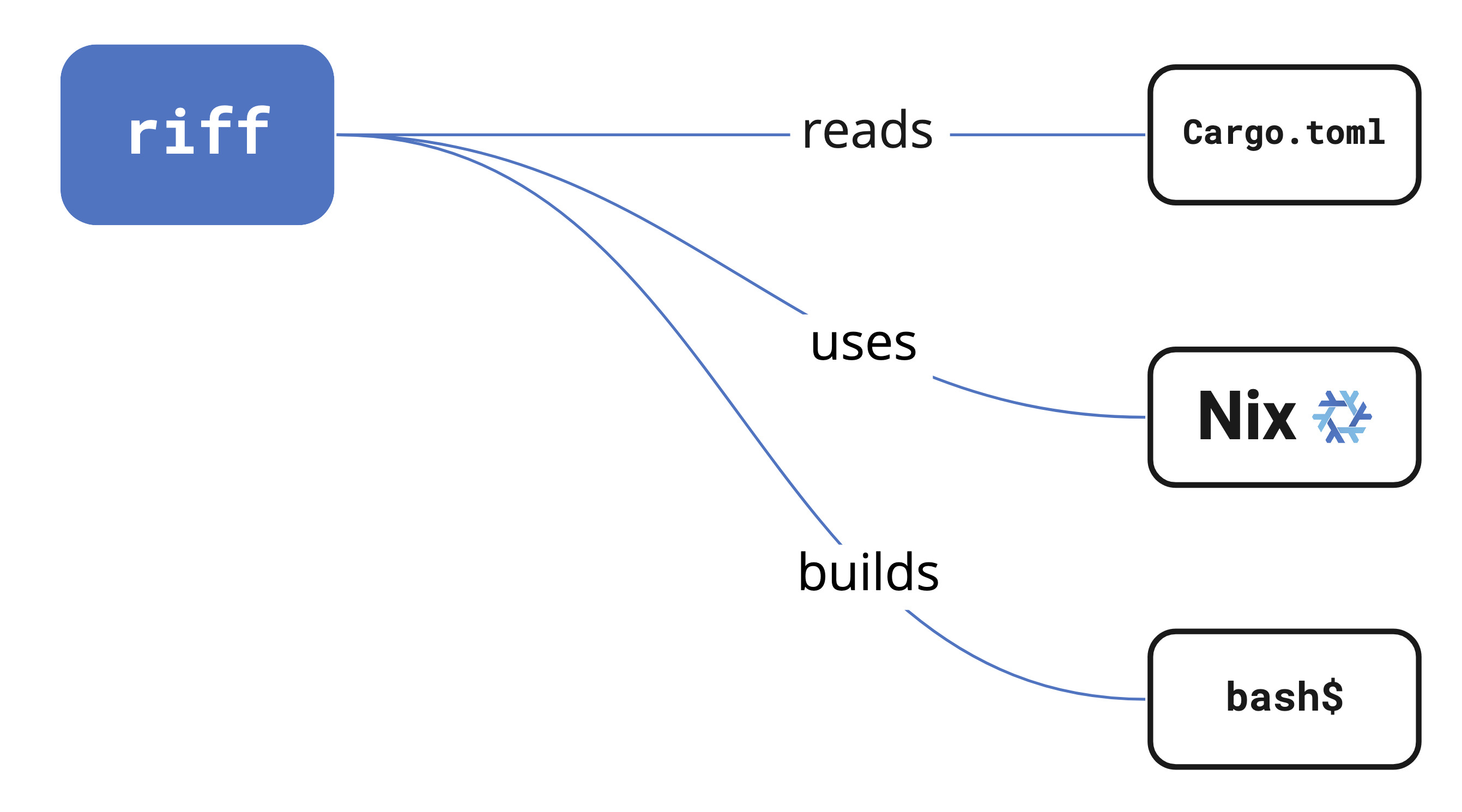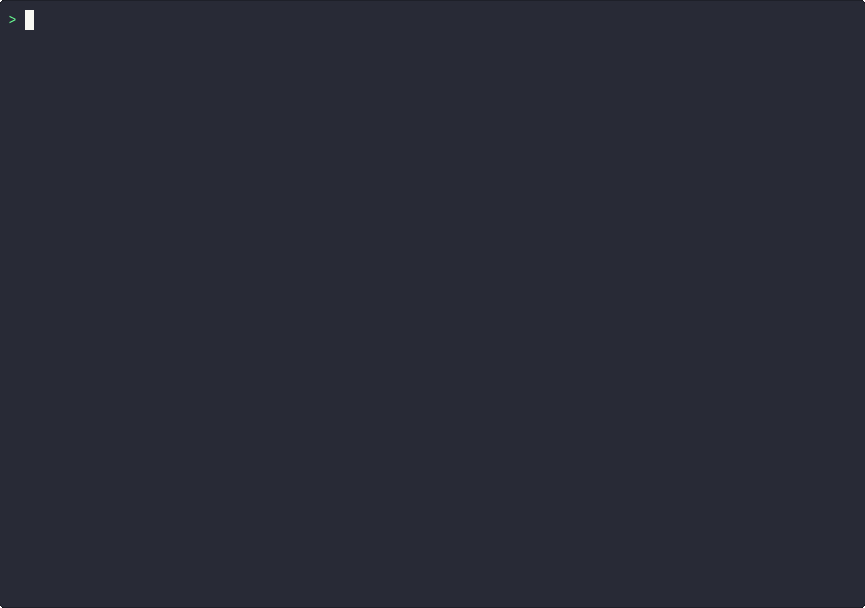Riff is a tool that automatically provides external dependencies1 for software projects. To enter a shell environment with all your project's external dependencies installed, run this at the project root:
riff shellYou can also directly run commands with the shell environment applied but without entering the shell:
riff run cargo buildRiff currently supports Rust with support for other languages coming soon. It uses the Nix package manager to handle dependencies but doesn't require you to know or use Nix.
For a video demo of Riff in action, see below.
To use Riff, you need to install these binaries on your system:
To install Riff using Nix (make sure to have flakes enabled):
nix profile install github:DeterminateSystems/riffMost programming languages use language-specific package managers to handle
dependencies, such as Cargo for the Rust language. But these
language-specific tools typically don't handle dependencies written in other
languages very well. They expect you to install those dependencies using some
other tool and fail in mysterious ways when they're missing. Here's an
example error from trying to build the octocrab crate without
OpenSSL installed:
--- stderr
thread 'main' panicked at '
Could not find directory of OpenSSL installation, and this `-sys` crate cannot
proceed without this knowledge. If OpenSSL is installed and this crate had
trouble finding it, you can set the `OPENSSL_DIR` environment variable for the
compilation process.
Make sure you also have the development packages of openssl installed.
For example, `libssl-dev` on Ubuntu or `openssl-devel` on Fedora.In cases like this, it's up to you to install missing external dependencies, which can be laborious, error prone, and hard to reproduce.
Riff enables you to bypass this problem entirely. It uses your your project's
language-specific configuration to infer which external dependencies are
required and creates a shell environment with those dependencies both installed
and properly linked. In cases where those dependencies can't be inferred, for
example in your build.rs script, you can explicitly declare
them in your Cargo.toml.
These environments are transient in the sense that they don't affect anything outside the shell; they install dependencies neither globally nor in your current project, so you don't have to worry about Riff breaking anything on your system. When you exit the Riff shell, the dependencies are gone.
In cases where you want to limit Riff's access to the Internet, you can run it
in offline mode, which disables all network usage except what's required by
the nix develop command (which Riff runs in the background). You can enable
offline mode using either the --offline flag or the RIFF_OFFLINE environment
variable. Here are some examples:
# Via flag
riff run --offline
# Via environment variable
RIFF_OFFLINE=true riff shellWhen running either riff run or riff shell you can use the --offline flag
to disable all network usage except the usage required to run
In this example, we'll build the Prost project from source. Prost has an
external dependency on OpenSSL, without which commands like cargo build
and cargo run are doomed to fail. Riff provides those dependencies
automatically, without you needing to install them in your regular
environment. Follow these steps to see dependency inference in action:
git clone https://github.com/tokio-rs/prost.git
cd prost
# Enter the Riff shell environment
riff shell
# ✓ 🦀 rust: cargo, cmake, curl, openssl, pkg-config, rustc, rustfmt, zlib
# Check for the presence of openssl
which openssl
# The path should look like this:
# /nix/store/f3xbf94zykbh6drw6wfg9hdrfgwrkck7-openssl-1.1.1q-bin/bin/openssl
# This means that Riff is using the Nix-provided openssl
# Build the project
cargo build
# Leave the shell environment
exit
# Check for openssl again
which openssl
# This should either point to an openssl executable on your PATH or failWhile Riff does its best to infer external dependencies from your project's
crate dependencies, you can explicitly declare external dependencies if
necessary by adding a riff block to the package.metadata block in your
Cargo.toml. Riff currently supports three types of inputs:
build-inputsare external dependencies that some crates may need to link against.environment-variablesare environment variables you want to set in your dev shell.runtime-inputsare libraries you want to add to yourLD_LIBRARY_PATHto ensure that your dev shell works as expected.
Both build-inputs and runtime-inputs can be any packages available in
Nixpkgs. You may find this particularly useful for build.rs
scripts.
Here's an example Cargo.toml with an explicitly supplied Riff configuration:
[package]
name = "riff-example"
version = "0.1.0"
edition = "2021"
[package.metadata.riff]
build-inputs = [ "openssl" ]
runtime-inputs = [ "libGL" ]
[package.metadata.riff.environment-variables]
HI = "BYE"
# Other configurationWhen you run riff shell in this project, Riff
- adds OpenSSL to your build environment
- sets the
LD_LIBRARY_PATHenvironment variable to include libGL's library path - sets the
HIenvironment variable to have a value ofBYE
If a project has OS-, architecture-, or vendor-specific dependencies, you can
define them in a targets block under package.metadata.riff. Here's an
example for Apple M1 (aarch64-apple-darwin) systems:
[package.metadata.riff.targets.aarch64-apple-darwin]
build-inputs = [
"darwin.apple_sdk.frameworks.CoreServices",
"darwin.apple_sdk.frameworks.Security"
]The Rust project maintains a list of well-known targets
that you can view by running nix run nixpkgs#rustup target list. This
field can also contain custom targets, such as riscv32imac-unknown-xous-elf,
although riff makes no effort to support cross compiling at this time.
When target-specific dependencies are present, the build-inputs and
runtime-inputs sections are unioned (joined), while the target-specific
environment variables override default environment variables.
macOS users may encounter issues with so-called "framework" dependencies, such
as Foundation, CoreServices, and
Security. When these dependencies are missing, you may see error
messages like this:
= note: ld: framework not found CoreFoundation
You can solve this by adding framework dependencies to your build-inputs as
darwin.apple_sdk.frameworks.<framework>, for example
darwin.apple_sdk.frameworks.Security. Here's an example Cargo.toml
configuration that adds multiple framework dependencies:
[package.metadata.riff.targets.x86_64-apple-darwin]
build-inputs = [
"darwin.apple_sdk.frameworks.CoreServices",
"darwin.apple_sdk.frameworks.Security"
]
[package.metadata.riff.targets.aarch64-apple-darwin]
build-inputs = [
"darwin.apple_sdk.frameworks.CoreServices",
"darwin.apple_sdk.frameworks.Security"
]If you add Riff metadata to Cargo.toml, this
doesn't just make it easier to build and run your project: it actually benefits
consumers of your crate as well. That's because Riff can use this metadata
transitively to infer which external dependencies are necessary across the
entire crate dependency graph. Let's say that you release a crate called
make-it-pretty that has an external dependency on libGL and you add that
to your Cargo.toml:
[package.metadata.riff]
runtime-inputs = [ "libGL" ]Now let's say that another Rust dev releases a crate called artify that
depends on your make-it-pretty crate. If someone tries to build artify using
Cargo, they may receive an error if they don't have libGL installed. But if
they use Riff to build artify, Riff knows to install libGL without any user
input.
The implication is that adding Riff metadata to your crates—if they have external dependencies—can benefit the Rust ecosystem more broadly.
When you run riff shell in a Rust project, Riff
- reads your
Cargo.tomlconfiguration manifest to determine which external dependencies your project requires and then - uses the Nix package manager—in the background and without requiring any intervention on your part—to install any external dependencies, such as OpenSSL or Protobuf, and also sets any environment variables necessary to discover those tools. Once it knows which external tools are required, it
- builds a custom shell environment that enables you to use commands like
cargo buildandcargo runwithout encountering the missing dependency errors that so often dog Rust development.
This diagram provides a basic visual description of that process:
Because Riff uses Nix, all of the dependencies that it installs are stored in
your local Nix store, by default under /nix/store.
You can see a video demo of Riff in action here (click on the image for a larger version):
In the video, running cargo build in the Prost project fails due to missing
external dependencies. But running riff run cargo build succeeds because Riff
is able to infer which external dependencies are missing and provide them in the
background using Nix.
You can add Riff support to Direnv on a project-specific or global basis. To
enable Riff in a project, create a .envrc file that contains this:
# reload when these files change
watch_file Cargo.toml Cargo.lock
# add any other files you might want to trigger a riff reload
# load the riff dev env
eval "$(riff print-dev-env)"You can enable Riff support globally by either adding a use_riff function
either to your ~/.config/direnv/direnvrc file or a new
~/.config/direnv/lib/riff.sh file. The use_riff function should look
something like this:
use_riff() {
watch_file Cargo.toml watch_file Cargo.lock
eval "$(riff print-dev-env)"
}With Direnv now aware of this function, you can enable Riff in any directory with:
echo "use riff" > .envrcWhen you run direnv allow you will automatically enter the Riff shell every
time you navigate to the project directory.
For the sake of improving user experience, Riff does collect some telemetry. You can read the full privacy policy for Determinate Systems, the creators of Riff, here.
To disable telemetry on any Riff command invocation, you can either
- Use the
--disable-telemetryflag or - Set the
RIFF_DISABLE_TELEMETRYenvironment variable to any value exceptfalse,0, or an empty string ("").
Here are some examples:
# Via flag
riff shell --disable-telemetry
# Via environment variable
RIFF_DISABLE_TELEMETRY=true riff run cargo buildFootnotes
-
We define external dependencies as those that are written in another language and thus can't be installed using the same language-specific package manager that you use to build your code. ↩



